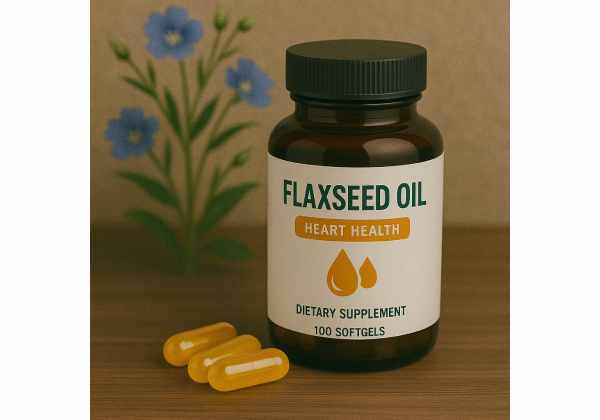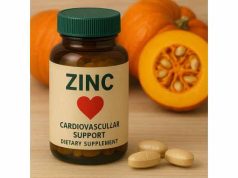
Flaxseed Oil has emerged as a popular natural option for those striving to maintain a robust cardiovascular system. Extracted from flax seeds, this nutrient-rich oil boasts a high concentration of alpha-linolenic acid (ALA), an essential omega-3 fatty acid linked to numerous heart-healthy advantages. From promoting balanced cholesterol profiles to reducing inflammation and supporting optimal circulation, Flaxseed Oil is increasingly recognized for its valuable role in staving off cardiovascular issues. Below, we explore how Flaxseed Oil for Heart Health may help protect against risk factors, assist with blood pressure regulation, and enhance overall wellbeing for individuals of diverse health backgrounds.
Table of Contents
- A Detailed Overview of Flaxseed Oil for Cardiac Support
- Key Mechanisms Behind Flaxseed Oil’s Cardiovascular Impact
- Research and Findings on Flaxseed Oil for Heart Wellness
- Recommended Intake, Best Practices, and Potential Concerns
- Frequently Asked Questions
- References and Sources
A Detailed Overview of Flaxseed Oil for Cardiac Support
Flaxseed Oil is derived from the seeds of the flax plant (Linum usitatissimum), which has been cultivated for thousands of years for both its fiber and nutrient profile. While ground flax seeds offer dietary fiber and lignans, the oil pressed from these seeds is particularly rich in alpha-linolenic acid (ALA)—an essential omega-3 fatty acid that the body cannot produce on its own. This characteristic, combined with a host of other beneficial compounds, places Flaxseed Oil at the forefront of natural choices for individuals seeking to bolster their heart health.
Historical and Cultural Context
- Ancient Uses: Early civilizations, including the Egyptians, understood the versatility of flax, weaving it into linen and harnessing its seeds for medicinal purposes.
- Traditional Medicine: In Ayurveda and other traditional systems, flax seeds have been utilized to support digestion, reduce inflammation, and nurture overall vitality.
- Modern Recognition: Today, Flaxseed Oil has gained substantial traction among nutritionists, integrative medicine practitioners, and everyday consumers who prioritize a diet rich in omega-3s.
Core Nutrients in Flaxseed Oil
- Alpha-Linolenic Acid (ALA): An essential omega-3 fatty acid that can convert in the body—albeit inefficiently—into other omega-3s like EPA (eicosapentaenoic acid) and DHA (docosahexaenoic acid). This conversion underscores ALA’s importance in supporting functions like cell membrane structure, anti-inflammatory pathways, and vascular maintenance.
- Omega-6 Fatty Acids: While Flaxseed Oil is best known for its omega-3 content, it also provides some linoleic acid, an omega-6 fatty acid needed in moderate quantities for various physiological processes.
- Phytonutrients: Small amounts of lignans and antioxidants can carry over from flax seeds to the oil, contributing to its potential anti-inflammatory and cholesterol-managing effects.
Why Flaxseed Oil for Heart Health?
- Cholesterol Management: ALA may help maintain favorable levels of HDL (“good” cholesterol) and regulate LDL (“bad” cholesterol).
- Blood Pressure Regulation: Several studies indicate that consistent dietary intake of omega-3 fatty acids could assist in stabilizing blood pressure.
- Inflammation Reduction: Unchecked inflammation is a common element in many cardiovascular disorders, and ALA’s anti-inflammatory capabilities can mitigate this process.
- Blood Vessel Elasticity: Omega-3 fats support healthy endothelium—an integral layer in blood vessels that influences blood pressure, clot formation, and overall vascular health.
The Role of Lifestyle and Diet
While Flaxseed Oil can serve as a potent ally for cardiovascular support, it functions best as part of a holistic plan. Balanced nutrition, regular physical activity, sufficient rest, and stress-management techniques amplify the oil’s inherent benefits. A diet that includes abundant fruits, vegetables, and other sources of healthy fats, such as avocados and nuts, synergizes effectively with Flaxseed Oil for Cardiovascular Health.
Culinary and Supplemental Paths
Incorporating Flaxseed Oil into daily routines can happen in multiple ways:
- Culinary Applications: While it’s not ideal for high-heat cooking (due to low smoke point), Flaxseed Oil can be drizzled over salads, blended into smoothies, or used as a finishing touch on dishes for a nutty flavor.
- Capsule Supplements: Many prefer the ease of standardized Flaxseed Oil capsules, which provide a measured dose of ALA.
- Fortified Foods: Some health-focused products, such as cereals or protein bars, fortify their formulas with Flaxseed Oil or ground flax seeds for added nutritional benefits.
By exploring these consumption options and understanding how Flaxseed Oil aligns with broader lifestyle strategies, individuals can more confidently incorporate this nutrient-dense oil into their daily health regimen. In the subsequent section, we examine the biochemical underpinnings—how exactly Flaxseed Oil’s compounds work to nourish the cardiovascular system and deter risks associated with heart disease.
Key Mechanisms Behind Flaxseed Oil’s Cardiovascular Impact
Flaxseed Oil’s value in heart-centered nutrition is largely credited to its high alpha-linolenic acid content. However, as with many functional foods and supplements, its benefits arise through an array of biochemical pathways. From supporting arterial integrity to moderating inflammatory responses, Flaxseed Oil helps cardiovascular function in a comprehensive manner.
1. ALA and Its Derivatives
- Conversion to EPA and DHA: A certain percentage of ALA can be metabolized into longer-chain omega-3 fats like EPA and DHA, typically found in marine sources. While the conversion rate is modest, these molecules play a central role in maintaining cardiac rhythm, reducing inflammation, and stabilizing arterial plaque.
- Anti-Inflammatory Properties: Through direct and indirect processes, ALA regulates the production of eicosanoids—signaling molecules that influence inflammation and immune function. By nudging these signals toward an anti-inflammatory state, Flaxseed Oil could help shield blood vessels from chronic irritation.
2. Balancing Omega-6 to Omega-3 Ratios
Contemporary diets often tilt heavily toward omega-6 fatty acids relative to omega-3s. This imbalance can foster inflammation, negatively impacting heart health over time. Incorporating Flaxseed Oil can help restore a more favorable ratio, potentially diminishing the risk of:
- Endothelial Dysfunction: Excess omega-6 can exacerbate vascular stress, while a better omega-3 ratio promotes smooth blood flow and pliable blood vessels.
- Excessive Clot Formation: A balanced omega-6/omega-3 intake can reduce platelet aggregation, which in turn lowers clotting tendencies.
3. Cholesterol and Lipid Control
Several constituents in Flaxseed Oil collaborate to aid lipid management:
- Soluble Fiber Derivatives: While the whole flax seed provides more fiber than the pure oil, minimal amounts of lignan and mucilage can still survive the extraction process, potentially helping reduce LDL cholesterol.
- Hepatic Lipid Metabolism: Omega-3s, including ALA, may help regulate how the liver processes cholesterol, encouraging the body to maintain healthy HDL and LDL levels.
4. Support for Vascular Tone and Circulation
Healthy blood vessels dynamically contract and dilate in response to the body’s needs. Overly rigid arteries or chronic vasoconstriction can drive up blood pressure and strain the heart. Flaxseed Oil fosters optimal vascular function through:
- Enhanced Nitric Oxide Production: Some research suggests that omega-3s stimulate nitric oxide, a molecule essential for vasodilation and efficient blood flow.
- Reduced Oxidative Stress: Antioxidant elements in Flaxseed Oil, even if modest, can protect the endothelium (the lining of blood vessels) from free radical harm.
5. Synergistic Nutrient Interactions
When Flaxseed Oil is part of a balanced diet, it may act synergistically with other nutrients:
- Magnesium and Potassium: Found in nuts, seeds, leafy greens, and certain whole grains, these minerals support normal blood pressure and restful muscular function, complementing Flaxseed Oil’s cardiovascular benefits.
- Plant-Based Polyphenols: Present in fruits, vegetables, tea, and cocoa, polyphenols may amplify Flaxseed Oil’s anti-inflammatory and antioxidant qualities.
6. Influence on Inflammatory Markers
Markers like C-reactive protein (CRP) offer a glimpse into systemic inflammation. Clinical observations sometimes note decreased CRP levels in individuals using Flaxseed Oil, pointing to lowered inflammatory load. This development is crucial, considering that heart disease often correlates with chronic inflammation in arterial walls.
By weaving Flaxseed Oil into a well-rounded lifestyle—one that includes nutrient-dense meals, physical movement, stress reduction, and routine checkups—users can maximize these mechanistic strengths. In the next section, we will delve into contemporary research findings on Flaxseed Oil Benefits for Heart Health, highlighting human and animal studies, real-world applications, and areas where further exploration is still needed.
Research and Findings on Flaxseed Oil for Heart Wellness
Numerous scientific investigations have examined the relationship between Flaxseed Oil and a variety of cardiovascular indicators. While each study has unique parameters—such as participant health status, dosage, and duration—a common theme emerges: Flaxseed Oil may confer notable improvements in lipid profiles, blood pressure control, and inflammatory measures.
1. Lipid Profile Improvements
A primary focus in evaluating Flaxseed Oil for Heart Health is its potential to stabilize cholesterol and triglyceride levels:
- LDL Reduction: Several trials report moderate declines in LDL (“bad” cholesterol) among participants supplementing with Flaxseed Oil, possibly linked to improved liver function and reduced cholesterol synthesis.
- HDL Support: Elevating HDL (“good” cholesterol) can be trickier, but certain research suggests consistent Flaxseed Oil usage might help preserve existing HDL levels or slightly boost them.
- Triglyceride Control: Some pilot studies propose that individuals with borderline-high triglycerides may experience small yet meaningful decreases when they incorporate Flaxseed Oil into their diets.
2. Blood Pressure Regulation
Omega-3 fatty acids, particularly those from marine sources like fish oil, have long been associated with a subtle but beneficial influence on blood pressure. Flaxseed Oil, as a plant-based omega-3 alternative, has yielded similar—albeit more modest—findings:
- Mechanism: The vasodilatory effects of omega-3 fats, alongside reduced inflammatory stress, appear to underlie these benefits.
- Clinical Observations: While not all studies document significant changes in systolic or diastolic blood pressure, participants with mild hypertension or prehypertension occasionally show improvement after weeks or months of consistent supplementation.
3. Anti-Inflammatory Effects and CRP Levels
Chronic inflammation is a persistent offender in many types of cardiovascular dysfunction, from atherosclerosis to arrhythmias. Observational data points to certain anti-inflammatory markers linked to Flaxseed Oil consumption:
- C-Reactive Protein (CRP): Clinical studies have shown reduced CRP in groups receiving Flaxseed Oil, suggesting a downregulation of inflammatory pathways.
- Joint and Heart Overlap: A few investigations focused on individuals with rheumatoid arthritis discovered that Flaxseed Oil might not only assist with joint inflammation but also yield improved cardiovascular markers.
4. Arrhythmia and Cardioprotection
Although Flaxseed Oil’s link to arrhythmia management is less documented than that of fish-derived omega-3s, preliminary work indicates potential heart-rhythm protective properties:
- Regulation of Cardiac Electrical Activity: Omega-3s support balanced calcium flow in heart cells and may help counteract irregular beats.
- Need for More Research: While small-scale animal studies hint at possible benefits, larger clinical trials in humans remain necessary to draw solid conclusions.
5. Weight and Metabolic Syndrome Factors
Obesity, elevated blood sugar, and high blood pressure often cluster under the term “metabolic syndrome,” amplifying heart disease risks. By assisting in weight management and promoting insulin sensitivity, Flaxseed Oil may indirectly bolster heart health:
- Satiety and Fat Metabolism: Some individuals report improved feelings of fullness when they include moderate amounts of Flaxseed Oil in their diet, possibly easing overeating patterns.
- Insulin Dynamics: There is tentative evidence that ALA influences insulin signaling, though the correlation is generally weaker than that observed with fish oil.
6. Comparing Flaxseed Oil to Other Omega-3 Sources
Fish oil and algae-based supplements remain the go-to sources of EPA and DHA. Nonetheless, Flaxseed Oil stands out for its:
- Vegan-Friendly Nature: Those avoiding animal products find Flaxseed Oil an accessible gateway to essential fatty acids.
- Versatile Culinary Usage: Mild taste profiles and ease of adding it to cold dishes or smoothies are appealing for daily consumption.
- High ALA Concentration: Some individuals prefer to rely on the body’s conversion of ALA to other essential omega-3 forms rather than ingest them directly from marine sources.
Evidence Synthesis
On balance, the scientific consensus acknowledges Flaxseed Oil as a beneficial plant-based supplement that can favorably modify heart health markers, specifically cholesterol levels and inflammatory metrics. However, outcomes can vary due to factors like genetic predisposition, diet composition, and existing medical conditions. While many findings are promising, professionals often recommend an integrative approach—encompassing other dietary, lifestyle, and therapeutic strategies—to optimize cardiovascular outcomes.
In the subsequent section, we’ll explore best practices for using Flaxseed Oil, including dosage suggestions, potential side effects, and safety guidelines that ensure a beneficial experience for most individuals looking to incorporate this supplement into their heart-health routine.
Recommended Intake, Best Practices, and Potential Concerns
Successfully harnessing the potential of Flaxseed Oil for Cardiovascular Health hinges on selecting quality products, adhering to suitable dosages, and understanding possible interactions. While Flaxseed Oil is widely regarded as safe for most healthy individuals, a few precautions remain pertinent for specific populations or circumstances. Below is a comprehensive guide on how to incorporate Flaxseed Oil responsibly into your daily life.
Selecting High-Quality Flaxseed Oil
- Cold-Pressed and Unrefined: Look for oils labeled “cold-pressed” or “expeller-pressed” to ensure minimal heat treatment and maximal retention of nutrients.
- Dark or Opaque Bottle: To protect sensitive fatty acids from light-induced oxidation, reputable brands often package Flaxseed Oil in dark containers.
- Storage: Refrigeration after opening is recommended, as it helps preserve freshness and slow down rancidity.
Suggested Dosages
- General Wellness: A common recommended dose is 1 to 2 tablespoons (approximately 15-30 milliliters) of Flaxseed Oil daily. This can be spread throughout the day, for example, added to morning smoothies or drizzled on salads at dinner.
- Capsule Formulations: If you prefer capsules, daily intakes can range from 1,000 mg to 3,000 mg, depending on the product’s potency. Always follow the label or your healthcare professional’s advice.
- Therapeutic Amounts: Some studies examining cholesterol or inflammation may use slightly higher daily doses, but medical oversight is crucial to avoid digestive discomfort or nutrient imbalances.
Best Ways to Use Flaxseed Oil
- Dressings and Sauces: Whisk Flaxseed Oil into vinaigrettes or dips for a smoother consistency and added omega-3 content.
- Blending into Smoothies: Mix a tablespoon with fruits, vegetables, and yogurt for a nutrient-packed beverage without significantly altering taste.
- Stirring into Cooked Foods: Drizzle the oil onto warm (but not boiling) foods to preserve its nutritional integrity. Avoid high-heat frying or baking with Flaxseed Oil due to its low smoke point.
Potential Drug Interactions and Precautions
- Blood-Thinning Medications: Individuals on anticoagulants (like warfarin) or antiplatelet drugs (like aspirin) should monitor their Flaxseed Oil intake closely, as omega-3s can have a mild blood-thinning effect.
- Diabetes Medication: While data is mixed, Flaxseed Oil may influence blood sugar control in some people. Anyone on diabetic medications should consult a healthcare professional for personalized guidance.
- Allergies: True flax allergies are uncommon, but they can occur. Symptoms might include itching, swelling, or gastrointestinal upset. Discontinue use and seek medical help if you suspect an allergic reaction.
- Pregnancy and Breastfeeding: Many women safely consume flax seeds and Flaxseed Oil in moderation during pregnancy and lactation, but always seek individualized medical input.
- Hormone-Sensitive Conditions: Because flax contains phytoestrogens, individuals with certain hormone-sensitive disorders should discuss potential implications with a qualified practitioner.
Side Effects and Tolerability
- Gastrointestinal Discomfort: A small percentage of users experience bloating, gas, or diarrhea when starting high doses of Flaxseed Oil. Starting low and gradually increasing may alleviate these concerns.
- Rancidity Risk: Once opened, Flaxseed Oil can spoil if exposed to heat or light, leading to an unpleasant taste or smell. Discard if the oil smells off or rancid.
- Overconsumption of Omega-6: Flaxseed Oil primarily contains omega-3 (ALA), but certain products might have some omega-6 content. As with all dietary fats, balance remains essential—do not rely exclusively on a single oil source.
Complementary Lifestyle Measures
Optimizing Flaxseed Oil’s heart-protective potential often requires broad lifestyle considerations:
- Balanced Nutrition: Incorporate plenty of fruits, veggies, lean proteins, whole grains, and other healthy fats (e.g., olive oil, nuts, seeds) to ensure a broad nutrient spectrum.
- Routine Exercise: Activities like brisk walking, swimming, or light resistance training can synergize with Flaxseed Oil’s inflammation-lowering and lipid-modulating actions.
- Stress Management: Chronic stress can undermine cardiovascular benefits. Techniques like yoga, meditation, or counseling may prove invaluable in supporting heart health.
By navigating dosage, potential interactions, and storage meticulously, individuals can enjoy Flaxseed Oil Benefits for Heart Health in a safe, effective manner. Up next, we will tackle common inquiries about Flaxseed Oil supplementation, providing concise answers grounded in best practices and current scientific knowledge.
Frequently Asked Questions
Is Flaxseed Oil for Heart Health beneficial for individuals with high cholesterol?
Yes. Flaxseed Oil’s alpha-linolenic acid can help manage LDL cholesterol and support healthy HDL levels. While results vary, combining Flaxseed Oil with a balanced diet and exercise may amplify its positive impact on cholesterol profiles.
How does Flaxseed Oil for Cardiovascular Health support blood pressure regulation?
Its omega-3 fatty acids contribute to better vasodilation, reducing inflammation and aiding overall vascular health. These effects can indirectly help maintain normal blood pressure, especially when paired with a low-sodium, nutrient-rich eating plan.
Which is better for heart wellness: ground flax seeds or Flaxseed Oil?
Both offer advantages. Ground flax seeds supply extra fiber and lignans, while Flaxseed Oil provides a concentrated dose of alpha-linolenic acid. The choice often depends on individual preferences and specific nutritional goals.
Does Flaxseed Oil Benefits for Heart Health also cover weight management?
Flaxseed Oil may contribute indirectly to weight control by promoting satiety and supporting metabolic functions. However, it works best as part of an overall strategy that includes calorie balance, exercise, and balanced macronutrient intake.
How much Flaxseed Oil Helps Cardiovascular Function daily?
A common guideline is 1 to 2 tablespoons per day for adults, or 1,000 to 3,000 mg of capsules. Individual needs differ, so it’s prudent to consult with a healthcare provider for personalized recommendations, particularly if on medications.
References and Sources
- Ganesan, K., & Xu, B. (2019). A critical review on polyphenols and health benefits of flaxseed: A nutraceutical approach. Food Frontiers, 1(1), 52–63.
- Bloedon, L. T., & Szapary, P. O. (2004). Flaxseed and cardiovascular risk. Nutrition Reviews, 62(1), 18–27.
- Fleming, J. A., & Kris-Etherton, P. M. (2018). The evidence for α-linolenic acid and cardiovascular disease benefits: Comparisons with EPA and DHA. Advances in Nutrition, 9(5), 624–637.
- National Center for Complementary and Integrative Health. (2021). Flaxseed and flaxseed oil: An overview.
- Pan, A., et al. (2009). Effects of flaxseed interventions on blood lipids: A meta-analysis of trials. Journal of the American College of Nutrition, 28(6), 555–563.
Disclaimer:
This article is for educational purposes only and should not be taken as a substitute for personalized medical guidance. Always consult a qualified healthcare professional before starting any new supplement regimen, especially if you have pre-existing conditions or take prescription medications.
We encourage you to share this article on Facebook, X (formerly Twitter), or your favorite social networks. Help others discover the heart-protective potential of Flaxseed Oil, and be sure to follow us for more tips on embracing a healthy, vibrant lifestyle!






